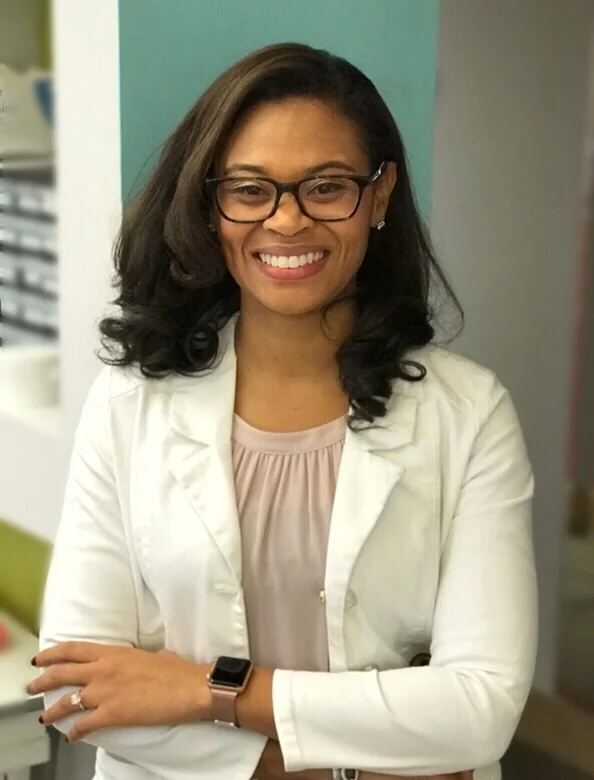My Interview on Oral Health Disparities & Orthodontic Basics with Dialosophy
I had the wonderful opportunity to meet with Adia Louden of Dialosophy and answer some questions on oral health, oral health disparities , and to go over some Orthodontic basic. Enjoy our Q & A session below:
Q: Dr. Smith, thank you for agreeing to talk with me on Dialosophy. I think before we get started…I’d be especially interested in hearing a bit of your story. How’d you get into orthodontics? And please don’t hold back. Educate us on the difference between dentists and orthodontists. What do kmorthodontists do?
A: I developed a liking for dentistry at around the age of 16. At that time, I was headed to college and I had to choose a major (I am Jamaican, at that time it was customary to finish high school at age 16). I had a family friend who was a dentist who encouraged me to pursue a career in dentistry, so I enrolled in the dental hygiene program at Northern Caribbean University - the only dental related program in the country at the time. Towards the end of my program I realized I wanted to do more than just clean teeth. That's when I decided to become a dentist, so I moved to the US, got a bachelors degree in Biology and applied to dental school. I was accepted into Howard University in 2010. After my first year I really started thinking about specializing. At first, I thought I wanted to be an Oral Surgeon (dead wrong, I don't have the personality for it). I started frequenting the Orthodontics department and quickly fell in love with it, so I did everything to align myself with getting accepted into Orthodontics residency. Quite a number of people don’t know the difference between an Orthodontist and a dentist. Orthodontics is a specialty of dentistry that focuses on aligning the jaws and teeth. We focus on how teeth meet and function, how they are aligned, how they are set in the jaws, and the positioning and sizes of the upper and lower jaws. Orthodontists go through two to three years of additional training after the initial four years of dental school.
Q: Thank you for sharing. So, let’s get right to it. Oral hygiene. Something that’s clearly important, but I know I’m not alone when say I often neglect it. I recently read about the oral health disparities that exist in our country, especially among people of color. So, I want to take a moment to ask you to expand on just how important is our oral care really? What do you recommend as “proper” oral care habits?
A: Oral healthcare is more important than a lot of people might realize. Your oral health can clue you in as to your overall health and conversely, your overall health can affect your oral health. Brushing, flossing and using a mouth rinse at least twice per day to remove the bacteria from the mouth are steps to make in forming proper oral care habits.
Q: What is being done to address the aforementioned oral health disparities in our nation? Especially among women and communities of color.
A: Despite major improvements in oral health for the population as a whole, oral health disparities exist for many racial and ethnic groups, by socioeconomic status, gender, age and geographic location. The economic factors that often relate to poor oral health include access to health services and an individual’s ability to get and keep dental insurance. This is an issue that different dental organizations have been trying to address. Interventions such as community water fluoridation, school-based dental sealant programs, incentive programs for dentists to live and work in deep rural areas and the implementation of dental auxiliaries are ways in which these issues are being combatted.
Q: I believe I saw on Instagram that you have your own organization where you venture and do mission trips to aid in disparity efforts globally. Please tell us about what you have done personally to address oral health disparities.
A: Correct. I am the co-founder of a dental non-profit organization “Dental Helping Hands”
along with two of my classmates/colleagues from dental school. It was founded to provide dental health services to underserved communities in developing countries. Our aim is to empower and support the communities we serve by partnering with local dental professionals to share knowledge. By providing communities with education on preventative measures to improve dental health, we honor, support and empower those with less and assist them in becoming self-sufficient. Our goal is to focus on preventative education while providing patients with a safe environment for necessary care.
I do at least one mission trip to my home country, Jamaica, per year and provide dental services to people of a deep rural area with no access to dental care. I partner with Dr. Mark Edwards, my mentor and the dentist who encouraged me to get into dentistry. He’s also the Dean of the College is Dentistry at the University of Technology and so we get student volunteers from the two dental schools on the island and dental hygiene students from my alma mater - Northern Caribbean University to help carry out our mission.
Q: Is there a connection between oral health and other health conditions? Which oral health symptoms should NOT be ignored?
A: Oral healthcare is more important than a lot of people might realize. Your oral health can clue you in as to your overall health. The oral cavity has a lot of bacteria (mostly harmless) but the mouth is the gateway to the digestive and respiratory tract. Blood vessels in the mouth also have a direct connection to the heart. Normally, the body’s natural defenses and good oral hygiene habits like daily brushing and flossing (at least twice per day) keep bacteria under control. However, without proper oral hygiene bacteria can reach levels that might lead to oral infections, such as tooth decay and gum disease. It can also lead to endocarditis, cardiovascular disease, pregnancy and birth complications and pneumonia. Other health conditions like diabetes and osteoporosis can drastically affect oral health.
Q: I think with so many trends going around now like charcoal toothpaste, which I’m currently trying ,….and at-home whitening systems…and home remedies such as oil pulling and baking soda…it can be confusing AND EXPENSIVE finding ways to whiten your teeth. How can we improve the whiteness of our teeth? Do you have any favorite products that you’d recommend?
A: Don’t underestimate the power of brushing and flossing, that’s key. Teeth inevitable begin to yellow with age, but a range of strategies can slow the progress or reverse it. Ways to whiten teeth are brushing with baking soda, using hydrogen peroxide, drinking coffee or tea through a straw, getting regular cleanings at the dentist’s office, over the counter whitening products like whitening strips and gels, and in office professional whitening at the dentist’s office. One of my fave whitening toothpastes is Crest 3D White/Brilliance.
Q: Merging into some orthodontic basics, what are some of the most common orthodontic problems?
A: The most common orthodontic problems are crowding, excessive spacing, abnormal eruption of teeth, a cross bite, underbite, overbite and excessive over jet.
Q: I imagine it’s common for children to get braces more than adults. And from talking to a few older women, braces doesn’t seem like a move older women try to make because of a variety of reasons (“beauty standards” probably being one of them). I have also noticed a few parents that will wait for their children to get braces. So, is there an “ideal age” for orthodontic treatment?
A: Most people think that the best time to have their child see an Orthodontist is during the pre-teen and teenage years. However, there are good reasons to have your child get an orthodontic evaluation a lot sooner. The American Association of Orthodontists (AAO) recommends a check up with an orthodontic specialist no later than age 7.
Q: Does dental hygiene and orthodontic treatment differ during pregnancy? If so, what does that look like?
A: Pregnancy may make women more prone to cavities and periodontal disease. This is partly due to hormonal changes, dietary changes and even morning sickness (stomach acids which can erode the teeth). Oral health is an important part of prenatal care, given that poor oral health during pregnancy can lead to poor oral health outcome for the mother and the baby.
Q: The last question for you, Dr. Smith, is all about you…and your favorites…and what you (as the expert) think we should be using (feel free to hyperlink). Before we get your favorites, thank you so much for taking the time to share a bit of your story and the importance of oral hygiene. I can speak for myself and say I definitely plan to use the information you shared because I don’t have time for anymore cavities. I got my first one this past summer, and ONE is enough for me. The whole procedure was traumatizing (LOL seriously). Thanks again, Dr. Smith, for sharing of piece of you…with Dialosophy.
Fav Toothpaste: Crest and Colgate are popular options. However, at the moment I’m really in love with Risewell. It’s a company that is all-natural and uses nano-hydroxyapatite instead of fluoride. Hydroxyapatite is a naturally occurring mineral that’s found in teeth and that helps in the remineralization of enamel. Studies have shown where it is more effective and safer than fluoride.
Fav Toothbrushe(s): An electric toothbrush is very helpful in removing plaque and debris from teeth. Popular options are ones from Oral B or Phillips Sonicare. However, a smaller, more light weight and inexpensive option is Quip. I really like quip because they are on a mission to really help individuals keep up with good oral hygiene habits. They send you a new brush head and toothpaste every 3 months with a subscription. I consider them the dentist's allying the fight for good oral hygiene.
Fav Mouthwash: I really like ACT because it doesn't contain alcohol and has fluoride that helps in preventing cavities. Recently I've been using and liking the mouthwash from Risewell. It uses nano-hydroxyapatite instead of fluoride and also does not contain fluoride.
Retainer Care: Retainers can be kept clean with brushing it with mild soap and a soft toothbrush. A product that I really love is Ever smile White Foam.
Dialosophy
Promoting the health, success, and human rights of all women












